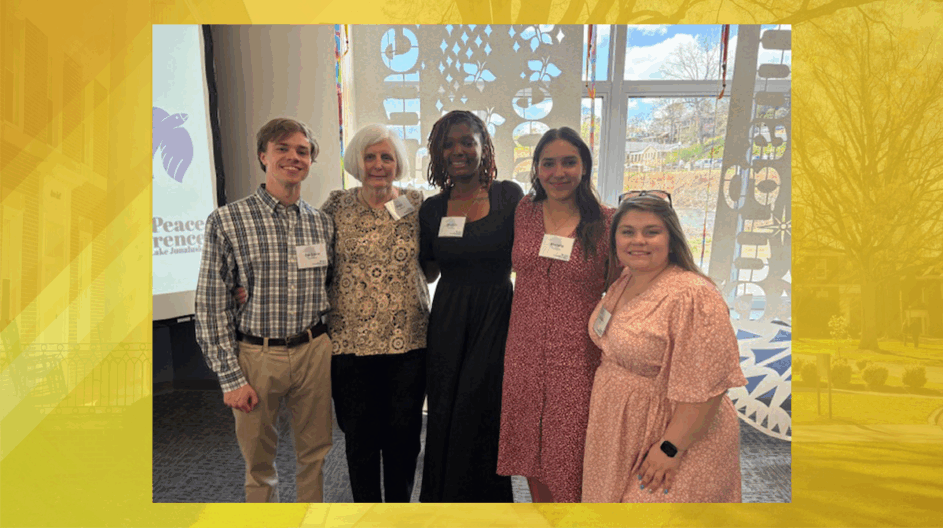
Pfeiffer Students Benefit from Attending Peace Conference
Earlier this month, Jonathan Bradsher ’25, a Francis Scholar who majors in History and in Religion and Practical Theology at Pfeiffer University, learned how to advocate for peace “in the reality of contested spaces through the lens and experience of Northern Ireland.” The insights he gained came courtesy of a talk that Rev. Dr. Gary Mason gave at the Peace Conference 2025, which the Western North Carolina Conference of the United Methodist Church presented at the Lake Junaluska (N.C.) Conference and Retreat Center.
Mason, who has worked in Belfast for almost 30 years, supports greater involvement by churches not only in high-profile international disputes but also in conflicts playing out in backyards.
“I thought that was a very interesting takeaway, which I personally agree with,” Bradsher said. “I think the church does have a role, if not a duty, to be involved in discussions, especially in local politics.”
Bradsher was one of four Pfeiffer students who attended the peace conference, accompanied by Rev. Dr. Doug Hume, Professor of Religion at Pfeiffer and Chair of its Department of Humanities, and Reverend Kris Mares, Pfeiffer’s University Chaplain and Director of Church Relations. The other Pfeiffer students were Shania Haynes ’25, a Strategic Communication and Social Media major; Renata Romero ’26 (Business Management and Leadership); and Emma Snow ’27 (Nursing and Psychology). Haynes, Bradsher, and Romero are all current Francis Scholars. Snow will be a Francis Scholar next year.
Francis Scholars participate in integrated service and academics, through the Francis Center for Servant Leadership & Faith Formation at Pfeiffer. Established in 1999 by Scott and Mary Liz Francis, committed Methodists with a heart for Christian ministry, the Center’s mission reflects John Wesley’s charge to love God and one another.
At the conference, the students participated in worship, plenary sessions, and various workshops, all amplifying a theme of “Breaking Down the Dividing Walls.” They heard expert speakers explore topics such as “Confronting Historic Hostilities”; “Strengthening Community Resilience”; “Skills for Disagreeing Better”; and “Creating Communities of Shalom.”
Snow said that she gained several benefits from attending the conference, including “learning how to lead with empathy, listening with intention, and making space for others to feel seen and valued.”
“I realized how important it is to create an inclusive environment where every student feels like they belong,” she added.
Mares knew the three days of fellowship, dialogue and learning would bear fruit when she encouraged the aforementioned Pfeiffer students to attend the peace conference.
“I thought the students would make some important connections at the peace conference — connections in their personal lives and connections with a larger community of people committed to peacemaking,” she said. “Francis Scholars are leaders on campus and in the community, so the information they learned about themselves and the world will help them develop as servant leaders.”
Reverend Beth Crissman, a Pfeiffer trustee, serves as the Uwharrie District Superintendent and Director of Peace Building Ministries for the Western North Carolina Conference. She directed the 2025 peace conference, the first such event following a six-year hiatus.
She said that future conferences — the next will be held March 13-15, 2026 at Lake Junaluska — will happen annually and “have a renewed focus and commitment to prepare younger generations for sustainable peace building for generations to come.” The presence of the Pfeiffer students, which she called “great,” has encouraged plans to expand the conference’s “reach to more college campuses for next year in hopes that students across the Southeast and beyond will be active participants in future conferences.”
Mares said that having the Pfeiffer students at the peace conference has filled her with “hope and encouragement.” “These students were engaged and reflective and really open to what they could learn,” she said. “We had deep, meaningful conversations at the end of each day, processing what they learned and considering how we might use what we learned on campus and in our lives. I hope I can bring some of the lessons – and speakers – to the Pfeiffer community during our next school year.”